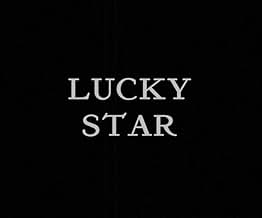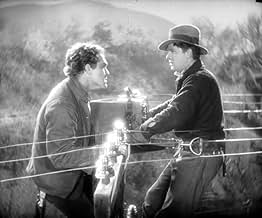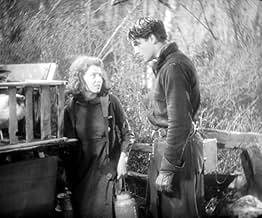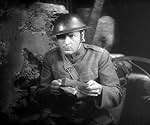Lucky Star
- 1929
- 1h 40min
CALIFICACIÓN DE IMDb
7.6/10
1.6 k
TU CALIFICACIÓN
Agrega una trama en tu idiomaMary, a poor farm girl, meets Tim just as word comes that war has been declared.Mary, a poor farm girl, meets Tim just as word comes that war has been declared.Mary, a poor farm girl, meets Tim just as word comes that war has been declared.
- Dirección
- Guionistas
- Elenco
- Premios
- 1 premio ganado en total
Opiniones destacadas
If someone wants to understand what happened between the end of the silent period and the beginning of sound, to experience an immersion in the sort of lyrical romance that people responded to at the time, there are few better films than Lucky Star. Both of the featured players, Janet Gaynor and Charles Farrell had already established themselves as audience favorites in films from Seventh Heaven on, and this simple tale of a crippled soldier finding love with a rustic local girl allowed both of them to give rich, likable performances without gross exaggeration or hysteria. For contemporary moviegoers, accustomed to multiple layers of irony and a cynical take on romance between a man and a woman, this film may be laughable, but for those willing to transport themselves to another world (which is what film can do so well!) director Frank Borzage's magical, shadowy, soft-focus rustic never-never land creates a sweet, idyllic romance
Lucky Star (1929)
*** (out of 4)
Entertaining silent drama has Timothy (Charles Farrell) and poor farm girl Mary (Janet Gaynor) meeting under bad circumstances before the start of WWI. After the war Timothy returns home as a cripple and soon he and Mary strike up a strong friendship, which doesn't sit too well with people in town or Mary's mother due to their prejudice against him being cripple. LUCKY STAR should have been a complete disaster but director Frank Borzage and the two stars do a remarkable job at building up the drama and there's no question that the message really packs a punch. The film is incredibly dark and this is especially true when it comes to the message of how people were pretty much throwing cripples into a lonely shack and forgetting about them. The message of this not being right is certainly well told here and especially because there's no melodrama preaching but instead it's perfectly built into the story. I was really surprised to see how dark this part of the story was told and it's pretty darn grim. Some of the best moments in the film deal with the blossoming relationship between the two stars. They made several films together and it's easy to see why because their chemistry just jumps right off the screen. The romance here is quite good and manages to keep a smile on your face throughout. Gaynor, as you'd expect, has no trouble playing the charming farm girl and Farrell is just as great and especially during his more dramatic scenes dealing with not being able to walk. Guinn 'Big Boy' Williams is excellent as the rival for Gaynor's attention and Hedwiga Reicher makes for a great villain as her mother. The ending is incredibly far-fetched but it's so perfectly executed that you can't help but get caught up in the drama.
*** (out of 4)
Entertaining silent drama has Timothy (Charles Farrell) and poor farm girl Mary (Janet Gaynor) meeting under bad circumstances before the start of WWI. After the war Timothy returns home as a cripple and soon he and Mary strike up a strong friendship, which doesn't sit too well with people in town or Mary's mother due to their prejudice against him being cripple. LUCKY STAR should have been a complete disaster but director Frank Borzage and the two stars do a remarkable job at building up the drama and there's no question that the message really packs a punch. The film is incredibly dark and this is especially true when it comes to the message of how people were pretty much throwing cripples into a lonely shack and forgetting about them. The message of this not being right is certainly well told here and especially because there's no melodrama preaching but instead it's perfectly built into the story. I was really surprised to see how dark this part of the story was told and it's pretty darn grim. Some of the best moments in the film deal with the blossoming relationship between the two stars. They made several films together and it's easy to see why because their chemistry just jumps right off the screen. The romance here is quite good and manages to keep a smile on your face throughout. Gaynor, as you'd expect, has no trouble playing the charming farm girl and Farrell is just as great and especially during his more dramatic scenes dealing with not being able to walk. Guinn 'Big Boy' Williams is excellent as the rival for Gaynor's attention and Hedwiga Reicher makes for a great villain as her mother. The ending is incredibly far-fetched but it's so perfectly executed that you can't help but get caught up in the drama.
Lucky Star is a lovely film. It's good to have a contrast, I ended up watching ten minutes of the Fantastic Four before this film. So after that incredible dross, the Borzage was a double-barrelled blast of wonder to the face. It's a very simple movie story-wise. We start off looking at a farm very early in the morning, still dark, it's awesomely Gothic, probably a set because it's so perfect, but you can't tell. You got these windy lanes and crooked fenceposts and creepy trees. Mary (Janet Gaynor) a dirty and chiselling but winsome little ragamuffin lives on the farm with her Ma and some littl'uns, Pa ain't around. She's milking the cow, probably at five in the morning, when the house is getting up. You can tell that life is pretty hard. It's about 2 minutes of cinema that's more precious than a dozen movies.
Anyway there's these two men Wrenn and Tim. Wrenn is a lazy good-fer-nuthin who is the foreman of the telegraph gang. Tim is the one he always gets to do the hard work. World War One comes and these guys decide to get a load of the world and pack off to France. Anyway we're shown in no uncertain terms during this episode how Tim is a nice guy and Wrenn, well he ain't. Private Tim ends up in a wheelchair when he gets back, on account of Sergeant Wrenn.
Mary is a grown up now, and Tim and Wrenn are vying for her affections. Wrenn has got the head start because he's a blackguard and he's not crippled. So it's a love story. It all seems real simple, but the nuance is what it's all about, the exquisite lighting and camera-work, the great partnership between Gaynor (Mary) and Farrell (Tim), and the heart-rending final scenes. It's simply a charming innocent movie, that there's no way could be made any more.
Tim has to undergo a harrowing struggle in order to get the girl. The snow scenes towards the end have to be seen to be believed.
Anyway there's these two men Wrenn and Tim. Wrenn is a lazy good-fer-nuthin who is the foreman of the telegraph gang. Tim is the one he always gets to do the hard work. World War One comes and these guys decide to get a load of the world and pack off to France. Anyway we're shown in no uncertain terms during this episode how Tim is a nice guy and Wrenn, well he ain't. Private Tim ends up in a wheelchair when he gets back, on account of Sergeant Wrenn.
Mary is a grown up now, and Tim and Wrenn are vying for her affections. Wrenn has got the head start because he's a blackguard and he's not crippled. So it's a love story. It all seems real simple, but the nuance is what it's all about, the exquisite lighting and camera-work, the great partnership between Gaynor (Mary) and Farrell (Tim), and the heart-rending final scenes. It's simply a charming innocent movie, that there's no way could be made any more.
Tim has to undergo a harrowing struggle in order to get the girl. The snow scenes towards the end have to be seen to be believed.
I wholeheartedly concur with the first reviewer. This is one of the most perfectly crafted of all silent masterpieces, and a further evidence that sound was unnecessary to produce such poignant and moving images. I was amazed how extremely haunting and luminous this movie was. There is no greater degree of luminosity; each scene is a lush, radiant extension of a romantic painting. The brief war scenes alone surpass those in "7th Heaven" and the ethereal romantic moments between Charles Farrell and Janet Gaynor match theirs in "Street Angel". I love that scene in which Farrel tells Gaynor why he's on the wheelchair. The photography and story may owe a lot to Murnau's epochal "Sunrise" but most of the material is Borzage's own.
Don't miss it.
Don't miss it.
This was my first exposure to Janet Gaynor, and I fell in love with her. She plays a poor, ragamuffin country girl who begins a timid romance with a wheelchair-bound WWI veteran (Charles Farrell), against the stern wishes of her mother, who wants her to marry instead a swaggering bully. Director Frank Borzage keeps the potential mawkish sentimentality at bay, and pulls achingly beautiful and naturalistic performances from his actors. When you watch Gaynor's face in this film, able to convey heaps of emotion (just get a look at her when she first realizes Farrell is confined to a wheelchair) with the most nuanced of glances, it's no surprise that she was able to make a successful transition to sound film and continue as a huge star and box-office draw throughout the 1930s.
The forbidden love storyline is the stuff of standard silent film melodrama, as is the suspenseful race-against-time finale that finds Charles Farrell willing himself to walk so that he can get to Gaynor before her husband-to-be takes her away forever. All of that is as silly as it sounds. But it's the quieter moments that give this film its gentle appeal: like the surprisingly erotic scene in which Farrell decides Gaynor needs a makeover and washes her hair with the yolks of a dozen eggs; or the beautiful bittersweet moment when Farrell gives Gaynor a gold bracelet that looks like an over-sized wedding ring.
A film center in Chicago is showing a festival of Gaynor and/or Borzage films, and I look forward to seeing more of both of them.
Grade: A
The forbidden love storyline is the stuff of standard silent film melodrama, as is the suspenseful race-against-time finale that finds Charles Farrell willing himself to walk so that he can get to Gaynor before her husband-to-be takes her away forever. All of that is as silly as it sounds. But it's the quieter moments that give this film its gentle appeal: like the surprisingly erotic scene in which Farrell decides Gaynor needs a makeover and washes her hair with the yolks of a dozen eggs; or the beautiful bittersweet moment when Farrell gives Gaynor a gold bracelet that looks like an over-sized wedding ring.
A film center in Chicago is showing a festival of Gaynor and/or Borzage films, and I look forward to seeing more of both of them.
Grade: A
¿Sabías que…?
- TriviaAccording the Netherlands Film Museum, which restored "Lucky Star", the film was originally a part talkie, with some dialog and effects, but the soundtrack has been lost.
- Citas
Mary Tucker: What's the matter with your feet?
Timothy Osborn: Nothing - just saving my legs.
Mary Tucker: What you savin' 'em for?
Timothy Osborn: For a special occasion.
- ConexionesFeatured in Murnau, Borzage and Fox (2008)
Selecciones populares
Inicia sesión para calificar y agrega a la lista de videos para obtener recomendaciones personalizadas
Detalles
- Tiempo de ejecución1 hora 40 minutos
- Color
- Mezcla de sonido
Contribuir a esta página
Sugiere una edición o agrega el contenido que falta




























